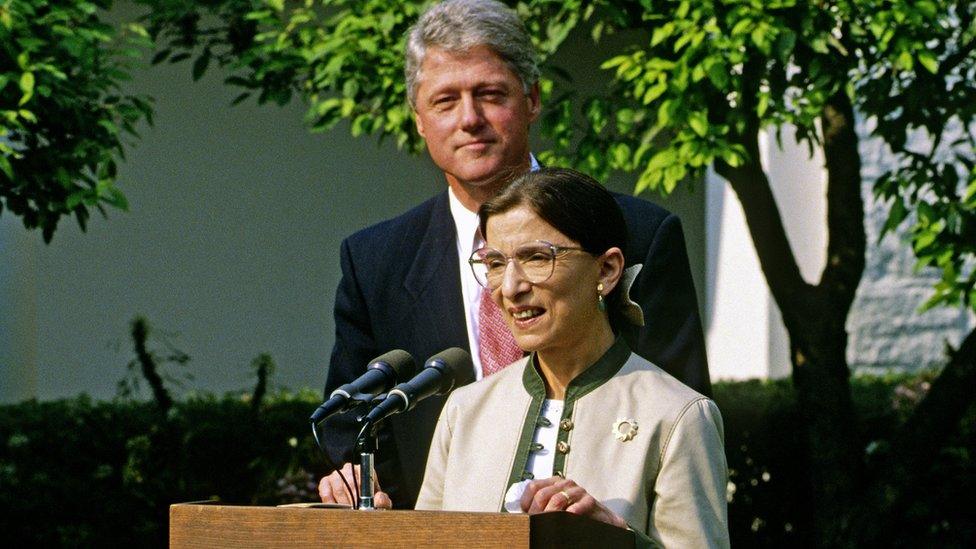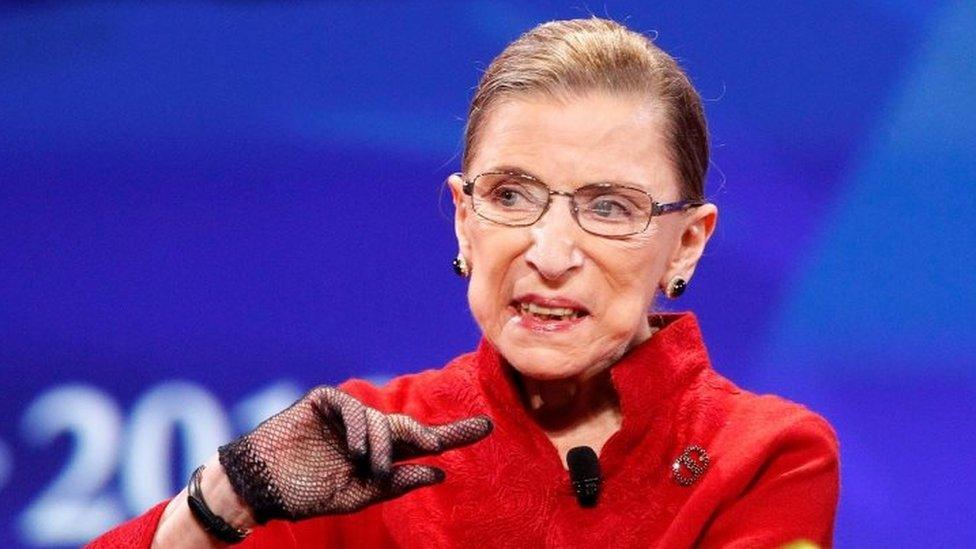Ruth Bader Ginsburg: Supreme Court judge was 'warrior for gender equality'
- Published
Hundreds of people visited the US Supreme Court to pay their respects to the late justice
Tributes are being paid to US Supreme Court Justice Ruth Bader Ginsburg, a "warrior for gender equality" who has died of cancer at the age of 87.
"There will never be another like her," former US Secretary of State Hillary Clinton has tweeted.
Ginsburg was only the second woman to sit on the Supreme Court, serving for nearly three decades.
She was hailed by progressives for her passionate advocacy of women's rights, civil liberties and the rule of law.
Within hours of the news of her death, hundreds of people had gathered outside the Supreme Court in Washington DC to pay their respects.
US President Donald Trump said in a statement that Ginsburg was a "brilliant mind" who led a "remarkable life" and who demonstrated that "one can disagree without being disagreeable".
Allow X content?
This article contains content provided by X. We ask for your permission before anything is loaded, as they may be using cookies and other technologies. You may want to read X’s cookie policy, external and privacy policy, external before accepting. To view this content choose ‘accept and continue’.

Democratic presidential candidate Joe Biden said she was "an American hero, a giant of legal doctrine, and a relentless voice".
Former President Bill Clinton, who appointed Ginsburg to the Supreme Court in 1993, tweeted that the US had lost "one of the most extraordinary Justices ever", external, adding her "landmark opinions moved us closer to a more perfect union".

Ginsburg speaks alongside then-President Bill Clinton on the White House lawn shortly after being appointed to the Supreme Court in 1993
In an interview with NPR reporter Nina Totenberg last year, Ginsburg described how the US constitution could be "powerfully hard to amend", using the example of the suffrage movement and the 19th Amendment - ratified in 1920, it guaranteed women the right to vote - and how it "was a 75-year struggle".
Paying tribute to Ginsburg, who was born to Jewish immigrant parents in Brooklyn in 1933, Ms Totenberg tweeted about the timing of her passing, and how it coincided with Rosh Hashanah - the beginning of the Jewish New Year.
Allow X content?
This article contains content provided by X. We ask for your permission before anything is loaded, as they may be using cookies and other technologies. You may want to read X’s cookie policy, external and privacy policy, external before accepting. To view this content choose ‘accept and continue’.

Writer and literary critic Ruth Franklin made the same observation.
Allow X content?
This article contains content provided by X. We ask for your permission before anything is loaded, as they may be using cookies and other technologies. You may want to read X’s cookie policy, external and privacy policy, external before accepting. To view this content choose ‘accept and continue’.

Shana Knizhnik. a lawyer who co-authored Notorious RBG: The Life and Times of Ruth Bader Ginsburg with Israeli-American journalist Irin Carmon, said she was "gutted" when she heard the news.
Allow X content?
This article contains content provided by X. We ask for your permission before anything is loaded, as they may be using cookies and other technologies. You may want to read X’s cookie policy, external and privacy policy, external before accepting. To view this content choose ‘accept and continue’.

Ms Carmon wrote in New York Magazine that Ginsburg, who was the oldest justice, may have been reluctant to retire because "like many women of her generation, it took so long for her to get a chance, and even longer for her to become the person she was supposed to be."
She tweeted that Ginsburg had once told her that she wanted to be remembered as someone who tried to "make things a little better through the use of whatever ability she has".
Allow X content?
This article contains content provided by X. We ask for your permission before anything is loaded, as they may be using cookies and other technologies. You may want to read X’s cookie policy, external and privacy policy, external before accepting. To view this content choose ‘accept and continue’.

Fellow journalist Rebecca Traister added: "May her memory be a blessing."
Allow X content?
This article contains content provided by X. We ask for your permission before anything is loaded, as they may be using cookies and other technologies. You may want to read X’s cookie policy, external and privacy policy, external before accepting. To view this content choose ‘accept and continue’.

European Commission President Ursula von der Leyen - the first woman to take the lead role when she took office on 1 December 2019 - wrote that Ginsburg "proved that women belong in all places of power where decisions are made".
Allow X content?
This article contains content provided by X. We ask for your permission before anything is loaded, as they may be using cookies and other technologies. You may want to read X’s cookie policy, external and privacy policy, external before accepting. To view this content choose ‘accept and continue’.
Former President Barack Obama said in a statement that Ginsburg "inspired the generations who followed her, from the tiniest trick-or-treaters... to the most powerful leaders in the land", external.
"She was a warrior for gender equality... Ginsburg fought to the end, through her cancer, with unwavering faith in our democracy and its ideals," he said.
While Ginsburg had five major run-ins with cancer, she only missed oral arguments at the US Supreme Court twice because of illness.
Toward the end of her life, she became an iconic figure to a new generation of young feminists - due in part to a social media account dedicated to Ginsburg called Notorious RBG - a nod to the late Brooklyn rapper The Notorious BIG.

You might also be interested in:
Justice Ruth Bader Ginsburg remembered
- Published19 September 2020

- Published20 September 2020
